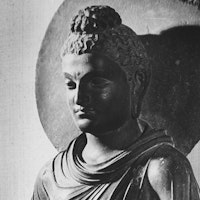Then the Exalted One rendered this meaning by uttering this verse of uplift: O how they cling and wrangle, some who claim / For preacher and monk the honored name! / For, quarreling, each to his own view they cling. / Such folk see only one side of a thing.
Then the Exalted One rendered this meaning by uttering this verse of uplift: O how they cling and wrangle, some who claim / For preacher and monk the honored name! / For, quarreling, each to his own view they cling. / Such folk see only one side of a thing.
Gautama Buddha

The Blind Men and the Elephant
Topic: Interfaith Pathways
“A number of disciples went to the Buddha and said, “Sir, there are living here in Savatthi many wandering hermits and scholars who indulge in constant dispute, some saying that the world is infinite and eternal and others that it is finite and not eternal, some saying that the soul dies with the body and others that it lives on forever, and so forth. What, Sir, would you say concerning them?”
The Buddha answered, “Once upon a time there was a certain raja who called to his servant and said, ‘Come, good fellow, go and gather together in one place all the men of Savatthi who were born blind… and show them an elephant.’ ‘Very good, sire,’ replied the servant, and he did as he was told. He said to the blind men assembled there, ‘Here is an elephant,’ and to one man he presented the head of the elephant, to another its ears, to another a tusk, to another the trunk, the foot, back, tail, and tuft of the tail, saying to each one that that was the elephant.
“When the blind men had felt the elephant, the raja went to each of them and said to each, ‘Well, blind man, have you seen the elephant? Tell me, what sort of thing is an elephant?’
“Thereupon the men who were presented with the head answered, ‘Sire, an elephant is like a pot.’ And the men who had observed the ear replied, ‘An elephant is like a winnowing basket.’ Those who had been presented with a tusk said it was a ploughshare. Those who knew only the trunk said it was a plough; others said the body was a grainery; the foot, a pillar; the back, a mortar; the tail, a pestle, the tuft of the tail, a brush.
“Then they began to quarrel, shouting, ‘Yes it is!’ ‘No, it is not!’ ‘An elephant is not that!’ ‘Yes, it’s like that!’ and so on, till they came to blows over the matter.
“Brethren, the raja was delighted with the scene.
“Just so are these preachers and scholars holding various views blind and unseeing…. In their ignorance they are by nature quarrelsome, wrangling, and disputatious, each maintaining reality is thus and thus.”
Then the Exalted One rendered this meaning by uttering this verse of uplift,
O how they cling and wrangle, some who claim/ For preacher and monk the honored name!/ For, quarreling, each to his view they cling./ Such folk see only one side of a thing.“
Gautama Buddha, also known as Siddhartha Gautama, was a spiritual teacher and the founder of Buddhism. Born in the 6th century BCE in Lumbini, now modern-day Nepal, he was destined for greatness. At the age of 29, he renounced his luxurious life as a prince and embarked on a spiritual quest to find the ultimate truth about human suffering and the nature of existence.
After years of intense meditation and self-discipline, Gautama attained enlightenment under a Bodhi tree in Bodh Gaya, India, at the age of 35. He became the Buddha, which means "the awakened one" or "the enlightened one." Gautama Buddha spent the rest of his life teaching the Four Noble Truths and the Eightfold Path, which formed the core principles of Buddhism. His teachings emphasized the importance of overcoming desire and attachment to achieve liberation from suffering. Known for his compassion and wisdom, Gautama Buddha's teachings have had a profound impact on millions of people worldwide, inspiring them to seek inner peace and spiritual enlightenment. His legacy as a spiritual leader and philosopher continues to resonate and guide individuals on their spiritual journeys to this day.
The Blind Men and the Elephant (Udàna)
Wilson, Andrew, editor. World Scripture II. Universal Peace Federation, 2011, pp. 389-390 [Udàna 68-69: Parable of the Blind Men and the Elephant].

Gautama Buddha
Copyright © 2017 – 2026 LuminaryQuotes.com About Us

Udàna 68-69: Parable of the Blind Men and the Elephant
This section contains selected passages calling for tolerance and respect for believers of other religions, and for conscientious people generally. Believers are urged to treat everyone with equal respect, not to have a different standard of conduct for people of other faiths than for one’s own community. Religious disputes and doctrinal conflicts are condemnable; they are often motivated by egoism disguised as piety, and by displaying enmity they do not give proper witness to one’s faith. The polemicist betrays his ignorance: attached to his own partial viewpoint, he cannot see the possible validity of another’s.
–World Scripture II. Universal Peace Federation, 2011, pp. 389-390 [Udàna 68-69: Parable of the Blind Men and the Elephant].
The Jain doctrine of Anekanta
Herein is included the famous parable, found in many sources, of the blind men and the elephant. It teaches the folly of regarding any single religious perspective as absolute and complete. Such is also the import of the Jain doctrine of Anekanta, which regards all disparate doctrines as complementary parts of a single whole.
Udàna 68-69: Parable of the Blind Men and the Elephant. This is an early version of this well-known Indian tale from the Buddhist canon, but ironically some assert it is of Jain origin. It does illustrate well the Jain doctrine of Anekanta, the many-sidedness of things.
–World Scripture II. Universal Peace Federation, 2011, p. 389-390 [Udàna 68-69: Parable of the Blind Men and the Elephant].
Persian Sufi mystic Jalalu’l-Din Rumi
Much later a poetic version called “The Elephant In the Dark Room” was composed by Persian Sufi mystic Jalalu’l-Din Rumi.
–World Scripture II. Universal Peace Federation, 2011, pp. 389-390 [Jalalu’l-Din Rumi (Masnavi 3.1259-1272, Islam)].
“The Elephant In the Dark Room”
Some Hindus had brought an elephant for exhibition and placed it in a dark house. Crowds of people were going into that dark place to see the beast. Finding that ocular inspection was impossible, each visitor felt it with his palm in the darkness.
The palm of one fell on the trunk. “This creature is like a water-spout,” he said. The hand of another lighted on the elephant’s ear. To him the beast was evidently like a fan. Another rubbed against its leg. “I found the elephant’s shape is like a pillar,” he said. Another laid his hand on its back. “Certainly this elephant is like a throne,” he said.
The sensual eye is just like the palm of the hand. The palm has not the means of covering the whole of the beast.
The eye of the Sea is one thing and the foam another. Let the foam go, and gaze with the eye of the Sea. Day and night foam-flecks are flung from the sea: How amazing! You behold the foam but not the Sea. We are like boats dashing together; our eyes are darkened, yet we are in clear water.
–World Scripture II. Universal Peace Federation, 2011, pp. 389-390 [Jalalu’l-Din Rumi (Masnavi 3.1259-1272, Islam)].